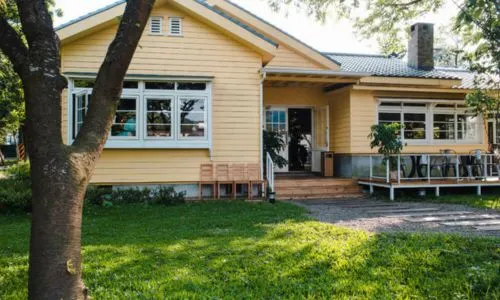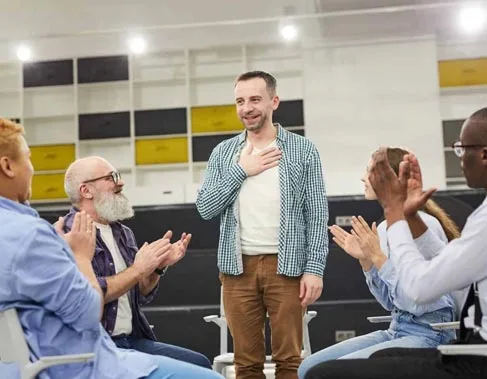Whenever you or a loved one has an alcohol or drug addiction you may struggle to understand how to address it. You can treat addiction even though it is a disease, and long term recovery is possible through professional rehab intervention methods.
On this page we detail how an holistic rehabilitation program can encourage you or a loved one to begin and sustain a life without drugs or alcohol.
What is Addiction Rehab (Rehabilitation)?
The term addiction ‘rehabilitation’ is applicable to all of the medical and therapeutic treatments used to help individuals who are struggling with dependencies on illegal or prescribed medications. Rehab treatments are best when they are personalized to your individual needs, and may encompass residential programs, outpatient programs, medically-managed detoxes and relapse prevention programs.

Facts & Statistics about Addiction in Watsonville
Prevalence of Substance Use Disorder, by Drug Type
(IN THOUSANDS)
- 2,7578.5%Any Substance
- 2,0886.4%Alcohol
- 1,0683.3%Ilicit Drugs
- 2060.6%Pain Medication
Drug- and Alcohol-Induced Deaths by Age Group, California, 2016
- Alcohol-Induced
- Drug-Induced
- 18 to 250.5
- 9.6
- 26 to 354.3
- 13.9
- 36 to 6424.2
- 22.9
- 65+23.7
- 9.4
Drug Use, by Selected Type and Age Group California, 2015 to 2016
- 12 to 17
- 18 to 25
- 26+
- Marijuana*13.2%
- 34.0%
- 13.5%
- Misuse of Pain Medications3.5%
- 8.0%
- 4.3%
- Cocaine0.8%
- 7.2%
- 1.8%
- Heroin0%
- 0.4%
- 0.2%
What are the treatment options available in Watsonville
By integrating treatment approaches, professionals can assist you to isolate and treat the root causes of your drug use disorders. Learning coping strategies to treat the root causes of your addiction is just as crucial as treating the symptoms of addiction.

Private Residential Programs
Residential rehab programs allow you to stay on the same property that you are getting treatments in. It is very beneficial to have 24-hour support and treatment access.
There is enormous value in taking yourself away from the home environment and becoming fully engaged in the rehabilitation program, because you are no longer exposed to the triggers and stressors that may have caused you to use substances. Successfully completing your rehab program and avoiding relapse is far easier when you are in a secure and controlled environment.
If you struggle with co-occurring illnesses, dual diagnosis or a strong dependency, an inpatient program is better suited to meet your treatment needs. Addiction recovery is achievable if you enroll in a residential treatment program, but if you want to maintain sobriety you are going to need to rise above the challenges that are associated with the early stages of recovery. Once the inpatient program is finished you will want to be more independent and your focus will be on the things you want to do with your new life.
Do You Need Help?
Immediate admissions available!

Sober Living Programs
You can build the skills needed to exercise control over your life by taking part in a sober living program, which will support you through the early stages of recovery. This will be done by:
- A house manager who checks up on you daily
- Advising you on how to behave in recovery
- Fostering important friendships with others in recovery who recognize your challenges and your experiences
Outpatient Programs
Outpatient treatment programs provide flexibility because you can maintain job or life requirements, while attending the rehab center for treatments.
Outpatient programs are best known for:
- Education about substance misuse
- Counseling and therapy by facilitating group settings or individual sessions – The minimum duration of an outpatient program is 3/4 months and may last longer than a year, this is based on your own requirements.
Detox Only Programs
Going through a drug or alcohol detox program is a vital stage in rehab as it deals with your physical dependency by eliminating substances from your system. During detox you will experience withdrawal symptoms as your body stabilizes to work independently of the substance it was dependent on.
Upon completion of the detox phase, you will move forward in your rehab journey, as you address the main causes for your dependency, to help you recognise the patterns and avoid it in the future. It is normal to undergo withdrawal and cravings for a few weeks after the substance has been eradicated from your body. Your chances of relapse can be mitigated as you learn the important skills necessary to cope with your new life.
Paying for Private Treatment
If you have chosen to commit to private rehab, you will need to cover the costs or begin a claim through your health insurance provider. The majority of health insurance providers will cover at least some of your rehab program, which includes detox, rehabilitation, medication and post-rehab support. The amount covered for your rehab treatment is dependent on your provider and the terms and conditions of your policy.
We recommend you understand how much cover you have prior to enrolling in a program. To find out what you could qualify for, visit our Verify Your Insurance page here. If you choose not get cover from your insurance provider, you will be responsible for paying the cost of treatment yourself. It may be possible to opt in to a payment plan if you cannot afford to pay the full amount straight away.
State Funded Programs
If you want to trackle your substance or alcohol problems but cannot afford private treatment, you can apply for a state-funded rehabilitation program. With the use of Medicaid and state budget funding, these programs can kickstart your recovery by offering:
- Medically-managed drug or alcohol detox
- Rehabilitation programs and aftercare support

If you are not covered by private health insurance or you live in a low income household, you should consider applying for a state-funded treatment program. You will need to provide:
- Evidence that you are a resident of the US
- Proof of your income
- Proof of living arrangements
- Medical details about your substance misuse
Click here to find out more about the application process. This pdf document provides contact details for your state agency.
State-funded addiction support available in Watsonville:
Pajaro Valley Prevention and Student Assistance Inc
411 East Lake Avenue, Watsonville, CA 95076
831-728-6445
www.pvpsa.orgEncompass Community Center Si Se Puede
161 Miles Lane, Watsonville, CA 95076
831-761-5422
www.encompasscs.orgJanus South County
284 Pennsylvania Avenue, Suite 1, Watsonville, CA 95076
831-319-4200
www.janussc.org
Maintaining Addiction Recovery in Watsonville
Sustaining recovery can feel hard once you return to life outside of rehab. The rehab environment was controlled and safe, and you were given professional support. When you leave, you may encounter new challenges or triggers that test your coping skills in ways you may not have anticipated. Long term recovery is more challenging if you have a severe dependency or if you return to your new life without social support structures in place. If you don’t have aftercare support or guidance in the initial stages of recovery, relapse can occur.
The following meetings are available in Watsonville:
KEEP IT SIMPLE GROUP
Keep It Simple Group, Speaker and Closed:
138 Jefferson Street, Watsonville, CA 95076
Friday: 8:00 pm
https://www.drugstrategies.org/ESTE ES EL CAMINO GROUP
Este Es El Camino Group Open:
1302 Lincoln Street, Watsonville, CA, 95076
Monday: 6:00 pm
https://www.drugstrategies.org/AA - Big Book Hour of Power Meeting
Wheelchair Access:
939 Lincoln Street, Watsonville, CA, 95076
Thursday: 6:00 pm – 7:00 pm
https://alcoholicsanonymous.com/
Aftercare & Alumni Programs
Aftercare programs are an extension of rehab once you leave the rehab center. By taking part in aftercare support, you can lessen the risk of relapse which hurts as many as 60% of people who have recently completed treatment. It is an essential service provided by most treatment centres. When your treatment is close to finishing, we will discuss the therapies and counseling that is helpful for your long-term recovery and an appropriate aftercare plan will be created to assist you. with staff and peers.

Clients who complete their rehab programs can join an alumni community program like ours, which provides you the chance to interact. You will enjoy access to Alumni events and receive guidance and encouragement from other people who are also in recovery long-term. We encourage you to consider helping other ex-clients within your network if you choose to.
Support Groups (Fellowship Meetings)
Support groups are vital to long-term sobriety as they focus on the importance of social structures in recovery. The 12-steps are is followed by support groups like Alcoholics Anonymous (AA) and Narcotics Anonymous (NA) which have proven to be successful in supporting individuals in recovery by hosting regular meetings. When you attend support groups, you will be able to share your own experiences in recovery and feel empowered by other individuals who are also in recovery. Through companionship and staying committed to the 12-steps, individuals in recovery can feel able to take responsibility for themselves and protect those that love them.
Support for Families & Children Affected by Addiction
The entire family unit is impacted by a household addiction, and some to a greater extent than others.
Support is critical for all members of a family, not just the person struggling with the dependency.
Participating in family support groups can help you to cope better, and also empower you to provide greater support to those struggling with dependency.
Your family members can benefit from support groups such as:
- Parents of Addicted Loved Ones
- SMART Recovery Family & Friends
- NAMI Family Support Groups
- Al-Anon
- Families Anonymous
- Alateen
- Nar-Anon










